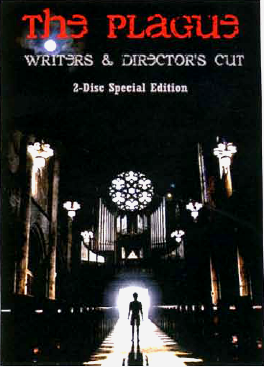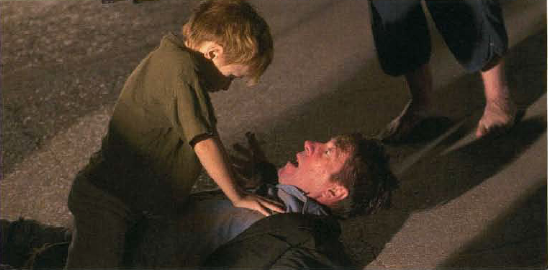THIS STUPENDOUS THOUGHT
by Pier Maria Bocchi (translated from the originally published Italian in the February 2011 issue of BLOW UP magazine)
 This Stupendous Thought is a type of promotional ad. Or at least one type of ad. Nothing hidden, nothing subliminal, just unequivocally direct and as appropriate as an aged bottle of J&B in a 70's Italian film. With one difference. I don't get a percentage. I was not paid to write this.
This Stupendous Thought is a type of promotional ad. Or at least one type of ad. Nothing hidden, nothing subliminal, just unequivocally direct and as appropriate as an aged bottle of J&B in a 70's Italian film. With one difference. I don't get a percentage. I was not paid to write this.
This is an American horror film from 2006 called The Plague. As of today, this is the first and only film by a director named Hal Masonberg. It is unreleased in Italy. Among the producers you'll find Clive Barker's name, but his involvement is dubious. The protagonist is played by James Van der Beek. In Post Production, Sony Screen Gems, who distributed the film, took it from the hands of Hal Masonberg and did not use his cut. It was released on DVD in the US. Shockingly cut and pasted together, this so called "producer's cut" disrupts the director's original version. It wasn't meant to make you think nor make a horror masterpiece of the decade, and it claimed no ownership as it navigated the horror genre with minimal originality. A little too obviously, according to the market.
As of today, Masonberg is not at peace. So much so that he has prepared a writers & director's cut unpublished and unavailable for purchase but ready for printing in a double DVD. In the hopes that Sony will notice and decide to make it an official product for sale. All this and much more is explained in detail here: www.spreadingtheplague.com. There is even a link to a petition.
Let's be clear. The Plague, in its original and integral version (I have not seen the reworked version) is far from being a production that horror fans MUST see. However, it is the attempt by a filmmaker who loves the genre (and understands it) enough to depart a little from convention, looking for a little bit of seriousness where it is increasingly difficult to find. And above all, when possible, without easily compromising, avoiding explicit gore, contrived scares, and a happy ending. It is the story of a group of people chased and decimated by a number of teenagers, with not exactly friendly intentions, who suddenly awaken after a mysterious coma that has lasted ten years. Anyone can remember the memorable, take the references they prefer, get back to the memory of every past horror movie he wants. But this is not the crux of the matter. The bottom line is that the production is terrifying because of the slowed performances, the sometimes surprising and unexpected editing, and of the refined suspense here and there.
This "hypothetical" double disc reports how each element should have been. The quality, of course, is what it is: having to do everything himself without the help of the studio or ad hoc equipment, Masonberg has struggled over a work-print (not in HD) that has not been color-corrected (the cinematography is by Bill Butler, his latest addition), but also the visual effects (see the green screen) and sound mixing were adversely effected.
In short, the result is not Blu-ray, although it is by far the most watchable and "finished" work-print I have ever seen. The commitment by Masonberg to make as much of a decent product as possible with non professional tools deserves respect: the DVD has everything to which we are accustomed to, from commentary to deleted scenes, to the traditional storyboards and featurette.
 However beyond philological analysis of the merits and defects (which there are, without a doubt) of the writers and director's cut of The Plague, why am I taking the trouble of this promotion? Why do I invest in an affair of this kind? Because Hal Masonberg is the descendant - far from the last, I'm sure - of a generation that "makes a film" that has been interfered with, blocked by or tampered with by the system. On either side of the ocean.
However beyond philological analysis of the merits and defects (which there are, without a doubt) of the writers and director's cut of The Plague, why am I taking the trouble of this promotion? Why do I invest in an affair of this kind? Because Hal Masonberg is the descendant - far from the last, I'm sure - of a generation that "makes a film" that has been interfered with, blocked by or tampered with by the system. On either side of the ocean.
Whether it's regarding the horror film or a Mr. Nobody or the blockbuster of a celebrated auteur, it makes no difference: at the end, under the guillotine of censorship and the dictates of power, there is always, however intrepid, the desire to try and experiment; the desire - humble, visionary, suicidal - to speak out from the pack. If Hollywood is taken upon by a rookie fighting for a product of few expectations, not to mention its genre, it means that once again the dagger is on the side of the handle and we have to support him. Old story.
Has anyone changed their mind and thought differently after such efforts? Perhaps no one has any desire to fight for these things anymore, at least not as they did in the past, when principle triumphed over figures, but after so much toil, after so much water under the bridge, after so many cinephiles and purists pursued delusions, and sometimes miraculously reached them, after all the philology, high and low, heralded with super mystic pride, of which I never regret, I find myself once again siding with any expression of freedom. Even the most insignificant. Crazy stuff.

 This Stupendous Thought is a type of promotional ad. Or at least one type of ad. Nothing hidden, nothing subliminal, just unequivocally direct and as appropriate as an aged bottle of J&B in a 70's Italian film. With one difference. I don't get a percentage. I was not paid to write this.
This Stupendous Thought is a type of promotional ad. Or at least one type of ad. Nothing hidden, nothing subliminal, just unequivocally direct and as appropriate as an aged bottle of J&B in a 70's Italian film. With one difference. I don't get a percentage. I was not paid to write this.  However beyond philological analysis of the merits and defects (which there are, without a doubt) of the writers and director's cut of The Plague, why am I taking the trouble of this promotion? Why do I invest in an affair of this kind? Because Hal Masonberg is the descendant - far from the last, I'm sure - of a generation that "makes a film" that has been interfered with, blocked by or tampered with by the system. On either side of the ocean.
However beyond philological analysis of the merits and defects (which there are, without a doubt) of the writers and director's cut of The Plague, why am I taking the trouble of this promotion? Why do I invest in an affair of this kind? Because Hal Masonberg is the descendant - far from the last, I'm sure - of a generation that "makes a film" that has been interfered with, blocked by or tampered with by the system. On either side of the ocean.